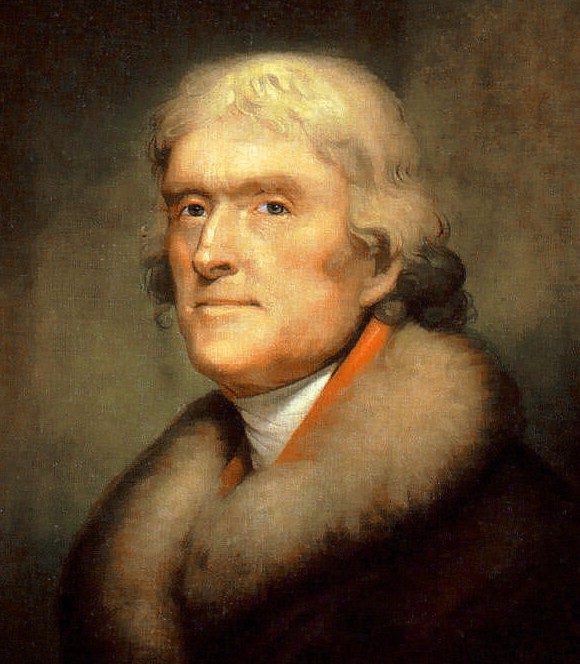Frases célebres de Thomas Jefferson
Frases de libros de Thomas Jefferson
Frases de fe de Thomas Jefferson
Variante: «El árbol de la libertad debe ser vigorizado de vez en cuando con la sangre de patriotas y tiranos: es su fertilizante natural»
Fuente: Carta con fecha del 13 de agosto de 1786 dirigida a su amigo George Wythe.
Cita con múltiples atribuciones desde al Antiguedad Clásica hasta el siglo XX.
Thomas Jefferson Frases y Citas
Fuente: Carta a Isaac McPherson, 13 de agosto de 1813.
Fuente: Thomas Jefferson to Isaac McPherson, 26 de septiembre, 2011, The University of Chicago, 1987, The Founders' Constitution, inglés http://press-pubs.uchicago.edu/founders/documents/a1_8_8s12.html,
Sobre miembros del clero los cuales trataban de lograr alguna forma de Cristianismo oficial en el gobierno de EE.UU. Carta al Dr. Benjamin Rush, 23 de septiembre de 1800.
“Es más honorable reparar un mal que persistir en él.”
Fuente: Carta a los jefes de la nación Cherokee, 1806.
Fuente: Jefferson, Thomas, Autobiografía y otros escritos, Madrid:Tecnos, 1987, página 618.
Fuente: Letter to John Taylor, 26 de septiembre, inglés http://teachingamericanhistory.org/library/index.asp?document=308,
Thomas Jefferson: Frases en inglés
See the Positive Atheism http://www.positiveatheism.org/hist/quotes/jeffphony.htm site on the extreme unlikelihood of this quote being authentic. It actually contains some known phrases of Jefferson's, but they are compounded with almost certainly false statements into a highly misrepresentative whole. Jefferson's own opinions on Jesus, God, Christianity and general opinions about them were far more complex than is indicated in this statement.
Misattributed
1810s, Letter to Edward Coles (1814)
Letter to M. L'Hommande, (1787), as quoted in The Jeffersonian Cyclopedia (1900), edited by John P. Foley, p. 500
1780s
ME 13:277
1810s, Letters to John Wayles Eppes (1813)
ME 13:431
1810s, Letters to John Wayles Eppes (1813)
1770s, A Summary View of the Rights of British America (1774)
“As pure a son of liberty as I have ever known.”
Statement about Tadeusz Kościuszko, in a letter to Horatio Gates (1798)
1790s
Letter http://etext.virginia.edu/jefferson/quotations/jeff1340.htm to James Madison (6 September 1789) ME 7:455, Papers 15:393
1780s
“There is not a sprig of grass that shoots uninteresting to me.”
Thomas Jefferson Letter (23 Dec 1790) to Martha Jefferson Randolph. Collected in B.L. Rayner (ed.), Sketches of the Life, Writings, and Opinions of Thomas Jefferson (1832), 192.
Posthumous publications, On botany
Thomas Jefferson, Letter (24 Mar 1824) to Mr. Woodward. Collected in The Writings of Thomas Jefferson: Correspondence (1854), 339.
Posthumous publications, On botany
Letter http://www.stephenjaygould.org/ctrl/jefferson_jadms.html to John Adams (15 August 1820)
1820s
Thomas Jefferson's First State of the Union Address (8 December 1801)
1800s, First Presidential Administration (1801–1805)
Letter to Thomas Cooper, 1814. ME 14:61
Posthumous publications, On financial matters
Letter to Jean Baptiste de Ternant, 1791. ME 8:247
Posthumous publications, On financial matters
Letter to Benjamin Waterhouse (19 July 1822), published in The Works of Thomas Jefferson in Twelve Volumes http://oll.libertyfund.org/ToC/0054.php, Federal Edition, Paul Leicester Ford, ed., New York: G. P. Putnam's Sons, 1904, Vol. 12 http://oll.libertyfund.org/Texts/Jefferson0136/Works/0054-12_Bk.pdf, p. 244
1820s
Letter to John Holmes (22 April 1820)
1820s
Letter to the Abbé Arnoux (19 July 1787) https://founders.archives.gov/documents/Jefferson/01-15-02-0275
1780s
Letter to Elias Shipman and others of New Haven (12 July 1801). Often misquoted as, "few die and none resign".
1800s, First Presidential Administration (1801–1805)
Thomas Jefferson's Eighth State of the Union Address (8 November 1808)
1800s, Second Presidential Administration (1805-1809)
Letter https://web.archive.org/web/19991115034104/http://odur.let.rug.nl/~usa/P/tj3/writings/brf/jefl64.htm to William Stephens Smith (13 November 1787), quoted in Padover's Jefferson On Democracy
1780s
“If a law is unjust, a man is not only right to disobey it, he is obligated to do so.”
Not attributed to Jefferson until the 21st century. May be a loose paraphrasing of a passage from Declaration of Independence (1776): "But when a long train of abuses and usurpations, pursuing invariably the same Object evinces a design to reduce them under absolute Despotism, it is their right, it is their duty, to throw off such Government, and to provide new Guards for their future security."
Misattributed
Variante: When injustice becomes law, resistance becomes duty.
Memoirs, Correspondence and Private Papers of Thomas Jefferson (1829) edited by Thomas Jefferson Randolph, p. 70
Posthumous publications
Letter to Albert Gallatin, 1803. ME 10:437
Posthumous publications, On financial matters
“I believe… that every human mind feels pleasure in doing good to another.”
Letter to John Adams (1816)
1810s
1770s, A Summary View of the Rights of British America (1774)
First attributed to Jefferson in 1945, this does not appear in any known Jefferson document. When governments fear the people, there is liberty... http://wiki.monticello.org/mediawiki/index.php/When_governments_fear_the_people,_there_is_liberty...(Quotation), Thomas Jefferson Encyclopedia. It first appears in 1914, in [Barnhill, John Basil, John Basil Barnhill, Indictment of Socialism No. 3, Barnhill-Tichenor Debate on Socialism, http://debs.indstate.edu/b262b3_1914.pdf, PDF, 2008-10-16, 1914, National Rip-Saw Publishing, Saint Louis, Missouri, p. 34]
Misattributed
Variante: Where the people fear the government you have tyranny. Where the government fears the people you have liberty.
On slavery, in a letter to John Holmes (22 April 1820)
1820s
